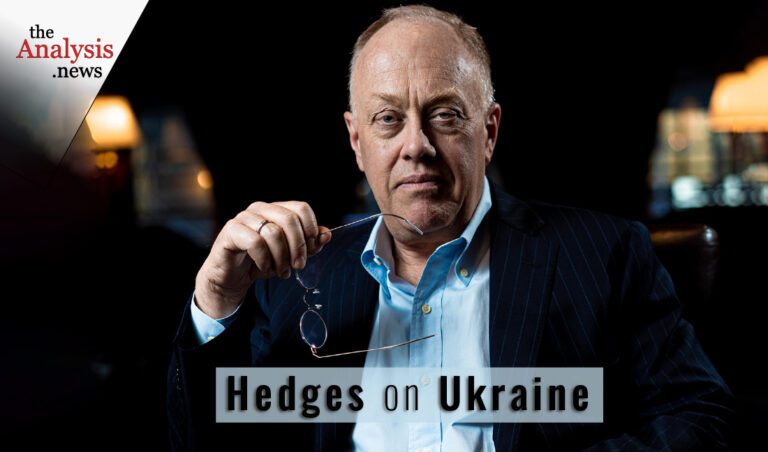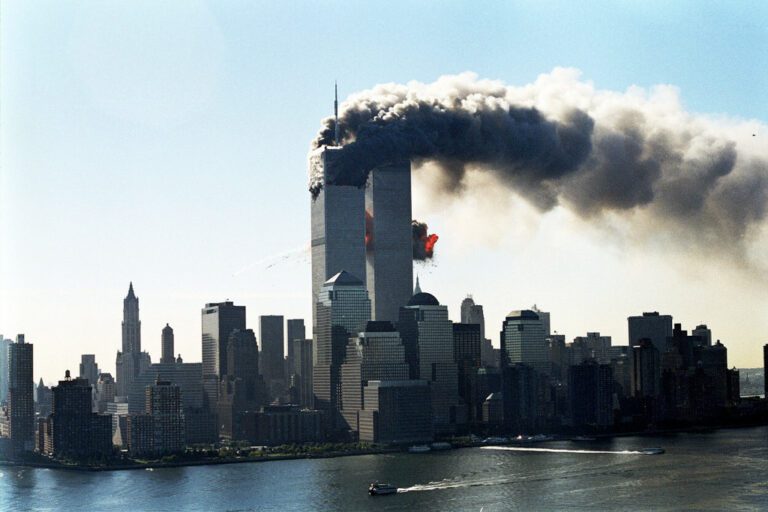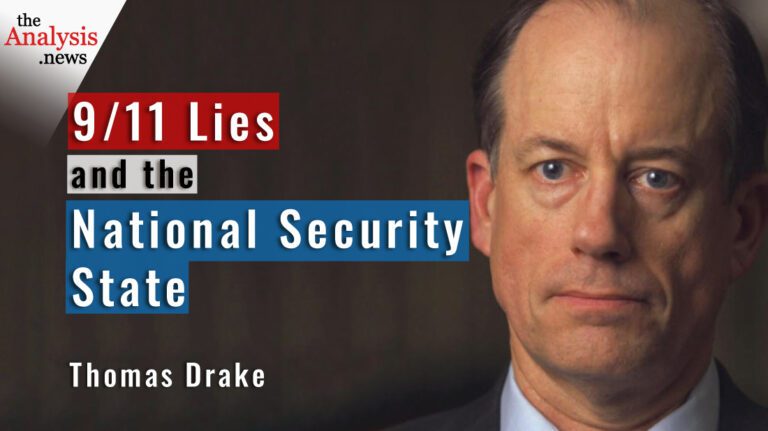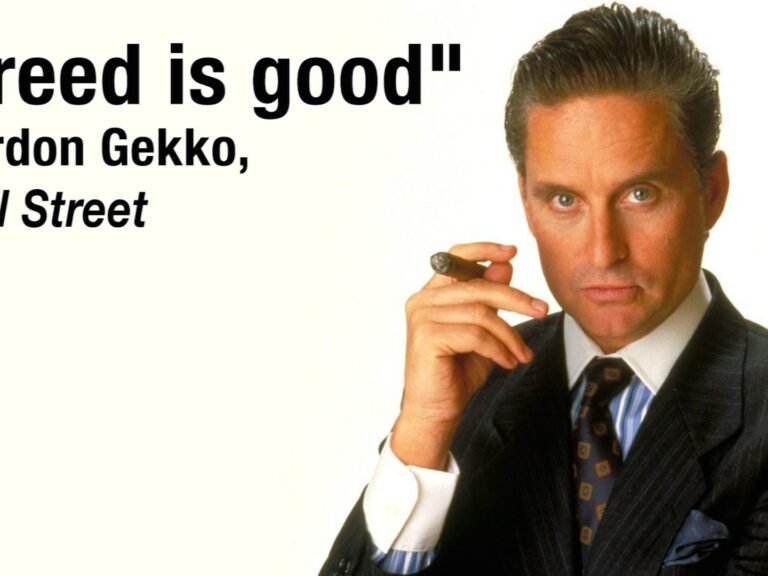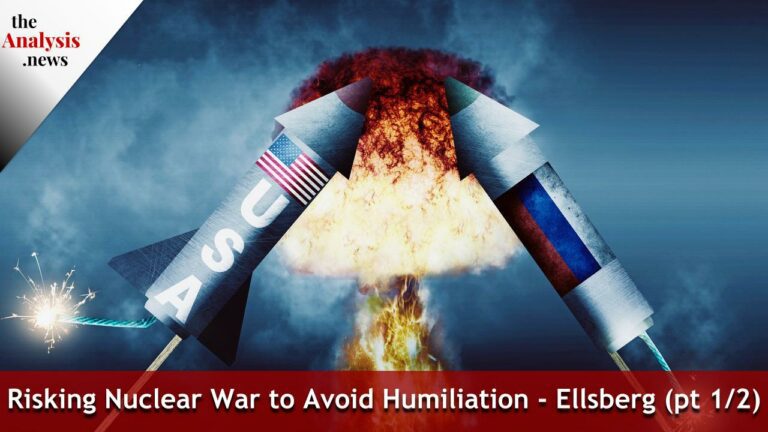On Reality Asserts Itself with Paul Jay, Mr. Robock says his initial work led him to investigate the role of volcanoes in global warming, but years of reports convinced him that CO2 is the most likely cause.
This is an episode of Reality Asserts Itself, produced April 30, 2014.
STORY TRANSCRIPT
PAUL JAY, SENIOR EDITOR, TRNN: Welcome back to The Real News Network. I’m Paul Jay, and this is Reality Asserts Itself.
We’re continuing our series of interviews with Alan Robock, who is a climatologist, a climate scientist, a meteorologist. And if you want to know more how we got here, you’ve got to watch part one, ’cause we’re going to just pick it up from here.
What were doing is we’re going to trace your evolution as a scientist from the beginnings of why you decide to study in climate and where you come to the conclusion that the scientific evidence persuades you that human activity causes global warming and climate change and such. So pick up in college. Why do you decide climate’s going to be your thing?
ALAN ROBOCK, LEAD AUTHOR, INTERNATIONAL PANEL ON CLIMATE CHANGE: After two years of graduate school, my masters adviser left MIT to–he retired, and I needed a new adviser. So I went to all the professors and I said, I’m interested in air pollution, I like computers. And Edward Lorenz, who became my adviser, said climate would be a good field to get into these days, in 1974. And I was lucky enough to take his advice. He’s the father of chaos theory. He’s quite well known in our field.
And so I took a climate model, a computer program to calculate how climate changed with time. And at the time, the temperature had been going up till about World War II, and then it had been going down a little bit. And that was what we were trying to explain. And so I looked at all the different things that cause climate to change–the carbon dioxide that we put in the atmosphere, volcanic eruptions, which episodically reflect sunlight, dust that we put into the troposphere. Even the heat that humans generate in cities and industries heats the atmosphere. Turns out that’s much less than the energy trapped by CO2, but that was was one of my conclusions. And so I ran the climate model. Also, natural variability, chaos, how much of it was just random, not caused by these external forces. And that’s what I did for my PhD dissertation. It was called “Internally and Externally Caused Climate Change”.
JAY: So that must have been pretty cutting-edge at the time. When you start to look at it, who else has been looking at it? How marginal, quote-unquote, was this at the time? ‘Cause I kind of remember back in those days when this story kind of started to break there were these environmentalists out there saying we’re doing this, and they were really not believed by anybody.
ROBOCK: As part of my research, I read every paper that had been written on climate change, and I wrote it down on a stack of index cards. And the stack of index cards was very thin, and I put colors on different–so I’d read everything. There wasn’t that much that had been done at the time. There was a study called Study of Man’s Impact on Climate published in 1970 (of course, we were sexist back then), and it sort of surveyed what we knew.
But computers weren’t very big at the time, weren’t very powerful, and so we couldn’t do these global general circulation models that we do now. I used an energy-balance climate model. It was sort of not very–sort of on the edge of what people did in the meteorology department. They were looking at the fluid flow, the dynamics of the 500 millibar flow, and a very mathematical-based thing, not looking at physical things like clouds and volcanoes. And so it was sort of a little bit different. But I published the first–I published my dissertation in 1978, and it was the first paper ever that showed how climate would change in time if you change CO2.
JAY: So when you’re working on your research, do you have this eureka moment where you say, ah! It’s carbon emissions! It’s not volcanoes!
ROBOCK: Well, I found that volcanic eruptions were very important in causing climate change, and my conclusion was that the climate change over the last several hundred years, volcanic eruptions were very important. You have to remember, this was in 1970s, and the climate wasn’t really warming. It was kind of flat since the end of World War II, and it wasn’t till the last several decades when it’s been warming rapidly. So it wasn’t clear what the balance was between all these different forces. And so the realization of the importance of CO2 came more gradually.
JAY: So your eureka moment was more that it’s actually random factors.
ROBOCK: Well, my dissertation said that random variations, just the natural variability of weather, could have caused the climate change of the last hundred years. It turned out my model was too sensitive to these random variations and it was wrong. So, over time, I published papers on the impact of volcanic eruptions, which is what I specialize in, and other people worked on the carbon dioxide effect and trying to quantify it. And it wasn’t until more recently that it was clear that CO2 was the dominant cause.
But people don’t understand there’s multiple causes of climate change, and they’re all happening at the same time. And so it’s not just one thing; it’s the battle between these different things that ends up in the net climate change. For example, it hasn’t warmed as much for the last 15 years as it did before that. Global warming deniers say, where’s global warming? Global warming theory is wrong. It turns out that’s not true. The greenhouse gases have continued to go up, but there’s been a series of small volcanic eruptions in the last decade. The ocean has gotten cold. There’s been an extended La Niña, which has trapped some of the energy in the ocean. China has rapidly industrialized, putting particles in the troposphere, and that’s reflected some of the sunlight. The sun has gotten a little bit less strong. There’s been an extended solar minimum. All those things add up, lots of little things that counteract the effects of greenhouse gases. And so all these things are happening all the time.
There’s a big El Niño forecast for later this year, so you’re going to see lots of news about how warm it’s gotten this year, and the global warming skeptics’ll say it’s just El Niño. But they started their trend in 1998 when there was the last big El Niño, and they started from the warmest period, not from the year before, where it was colder, when you would have an upward trend.
JAY: Now, I’ve done a few documentary films that required me to interview scientists. I did one on evolution or development of human language, and I would talk to one guy who would tell me it’s all about big brains and it’s big brains are decisive, and somebody else it’s the movement of the larynx, and somebody else it’s bipedalism. And a lot of it’s driven by funding. If your thing was volcanoes, you would have had a kind of an interest, one would think, in that it’s very much about volcanoes. So when does the evidence persuade you?
ROBOCK: No, no, my interest is in quantifying the effects of volcanoes. For example, the Mount Saint Helens volcano erupted in 1980. It was the eruption that got me tenure. I started at Maryland three years earlier. I published two papers in the journal Science, which is a very well–the top journal in our country. One of them said the Mount Saint Helens eruption had no effect on climate, and I published a paper about that. Another one was about the effects on weather. It caused the temperatures in Washington State to just–temperature to be constant for a day because there was so much dust that it was sort of separated from outer space. And that was another paper that we published in Science. So I’m more interested in quantifying it, getting it right, not proving that one thing is more or less important.
JAY: Well, you’re a scientist.
ROBOCK: Yeah.
JAY: When does the evidence–the coin drop for you, you are persuaded that the evidence now is it’s really mostly–not maybe exclusively, but mostly about carbon emissions? And what’s the process that gets you to that conclusion?
ROBOCK: The Intergovernmental Panel on Climate Change, the IPCC, was established to inform the public and policymakers about what we know and don’t know about climate change. The first one said it’ll be another decade before we can determine whether climate is even warming.
JAY: What year is this?
ROBOCK: This was about 20 years ago. The second one–okay, so it was 1995. Yeah. The second one, in 2001, said the balance of evidence suggested discernible human impact on climate, that is, so, at least a 50 percent chance that humans have some impact on climate, not quantifying what it was. Six years later, it’s very likely that most of the warming of the past 50 years has been caused by humans. So during that time period, there’s more warming going on. We tried to explain the warming with other things, and that was the only thing that made sense. And so I’m informed by that. It’s an assessment of the entire scientific community. And I think we were–it was more–it was pretty clear 20 years ago how important the effects of greenhouse gases were. But models got better, our computers got bigger, we could include more parts of the climate system, look at it in more detail, and the data get better. And so it was a gradual thing. So I didn’t write a paper saying we’ve proven that now CO2 is the cause. It’s sort of a statistical thing. The last one said it’s extremely likely that humans are causing it, greater than a 95 percent chance.
So there is no such thing as a eureka moment, because it’s all statistical. What we’re saying is that there’s at least a 95 percent chance that humans are causing most–are the biggest cause of climate change right now and it’s–overwhelms all these other things which are going on at the same time.
JAY: Like volcanoes [crosstalk]
ROBOCK: Like volcanoes, like pollution in the troposphere. We’re trapping more energy than is being reflected by the sun from the particles, for example.
But that means there’s a few percent chance that we’re wrong, there’s something else causing the warming that nobody’s figured out yet. So you never say–.
JAY: How do you come up with that number, 5 percent where it might be wrong? How does that variation–how is that determined? How do you get to that?
ROBOCK: It’s really a subjective judgment by all the scientists who work on it. There’s no way you can actually do a statistical test and say we’re sure.
JAY: So, I mean, it could be 5 percent wrong, it could be 10 percent wrong.
ROBOCK: Yeah.
JAY: But what we’re saying is the preponderance of evidence is telling us that–.
ROBOCK: Well, it’s–in the last IPCC reports, it’s gone–the last four, it’s gone from a 50 percent chance to a 67 percent chance, to a 90 percent chance, to a 95 percent chance. And so the more we look at it, the more warming we get, the harder it is to explain any of it, to think of any other reason why it’s warming.
JAY: Okay. So in terms of the year and your evolution as a scientist, when are you convinced that that’s the evidence?
ROBOCK: Twenty years ago.
But, again, you say “convinced”. It’s not a question of yes or no. It’s a question of there’s a much greater chance that we’re doing it. So I’m never–.
JAY: Okay, then convinced that that–. I hear you. You’re still 5, 10, 15 percent open that it could be something else.
ROBOCK: Yeah, yeah, yeah, yeah.
JAY: I mean, there is no absolute truth on this stuff, on anything, and particularly on this kind of stuff.
ROBOCK: Well, I think that somebody asked me once to have a debate about global warming, and I said, I don’t want to debate that, because I don’t want to debate whether it’s–I’m 100 percent convinced that the planet’s warming. One of the questions was: are the data good enough to say that we’re warming? People claim that it’s–the thermometers are only in cities, and the cities are warming–you’re measuring the urban heat island and not global temperature. We know that that’s not true.
JAY: Yeah, ’cause people went back and actually did just–.
ROBOCK: We adjusted it. But there’s also–
JAY: And came back with the same results. Yeah.
ROBOCK: –melting ice sheets where there’s no people around, sea levels rising. Precipitation’s changing. There’s many pieces of evidence that show that the planet’s getting warmer. So I’m 100 percent convinced on that.
JAY: And there was recently a scientist–I forget his name, but I think he was actually commissioned by the Koch brothers to–.
ROBOCK: Oh, I met him a couple of weeks ago.
JAY: Oh. Tell that story quickly, ’cause that’s interesting, ’cause he was supposed to prove that there is no global warming.
ROBOCK: He’s a physics professor at Berkeley.
JAY: What’s his name?
ROBOCK: Richard Muller, physics professor. And he’s–thinks highly of himself, as many physicists do, and he was convinced that it wasn’t warming. So he got funding from various sources, including the Koch brothers, and he got all the data on temperature, every single thermometer in the world, many more than are typically used in an analysis, and he put them all together, and he averaged them–and he didn’t do any quality control like we do, but he averaged everything together. And lo and behold, he got exactly the warming that we all knew was there. And so he was open-minded enough to say, I was wrong, it really is warming.
JAY: And his next step, though–what does he think about the issue of what causes it?
ROBOCK: So his next step was to do a very simple statistical model looking at the correlation between carbon dioxide and temperature, correlation between other things. And he said, yes, CO2’s going up, temperature’s going up. Proven. And I said to him–I was just talking to them a couple of weeks ago, ’cause I was in Berkeley for a conference. I said, but, you know, that’s not really the right way to do it. You really need a model, you need a little bit more–you have to take into account the heat in the ocean, you have to wait for the ocean to warm up. It doesn’t happen instantaneously. He said, well, it only takes ten years or so for the upper ocean. It’s good enough. And I said, you know, there’s a very–. You know, I don’t have a general circulation model to use. And I said, well, there’s a pretty simple model called MAGICC you could use. It’s on the web. It’s free. You could use that. And that would give you–and people would trust that, because it’s a well-established model. Why don’t you do it like that? Oh, okay. Well, I’ll tell my postdoc about that.
But he’s open-minded. He looked at the data and he reported what he found. And even though–and I said, that paper you got on the statistical relationships, where is that published? Could you show me the paper? Well, it’s in one of these terrible no-name journals. I couldn’t get it published in one of the good journals because they don’t like me. And an alternate hypothesis is that the reviews say you could have done it better or it wasn’t new. But, anyway, he was open-minded enough to take the Koch brothers’ money and then say that global warming is real.
JAY: And that seems to be now not the debate, whether it’s real or not.
ROBOCK: It used to be.
JAY: It used to be.
ROBOCK: So now they’ve switched to something else.
JAY: Yeah, now it’s switched to something else.
ROBOCK: Yeah.
JAY: Let’s go back to your history. So mid ’90s, the evidence persuades you that the likelihood that human endeavor is causing carbon emission, causing climate change, is the most likely theory.
ROBOCK: Now, I wouldn’t say it that way. I would say the strength of the warming caused by the carbon dioxide and other greenhouse gases we’re putting in is enough to cause the warming that we’re seeing, but there’s other things happening at the same time. So there’s–you know, in 1991 there was a big volcanic eruption, Mount Pinatubo, the biggest one of the 20th century, and the next year, 1992, was colder. Some skeptics said, where’s global warming? And the answer is: our theory tells us that all the sulfuric acid cloud in the stratosphere caused by Pinatubo reflects sunlight and should cause cooling. If there wasn’t cooling, that would cause us to question our theory. But those particles fell out after a couple of years of the warming resumed.
JAY: At what point in this evolution of your thinking and the science do you get how serious this is to human society? And how does that affect your decisions and what you’re going to do with your life?
ROBOCK: I’m interested in climate change, and the topic of the human impacts on climate by nuclear war is what really makes me passionate, not global warming. I think we have to solve the problem of nuclear weapons with the luxury of worrying about global warming. We could talk about that separately.
JAY: Yeah, and we will.
ROBOCK: So it’s–repeat the question.
JAY: Well, since the mid ’90s, when the science has become evident, according to most scientists, the predictions on the consequences of global warming and climate change have gotten increasingly apocalyptic, to the point where now the predictions of the effects of climate change, certainly in many parts of Africa and Latin America and Asia, are drastic, and not long afterwards fairly apocalyptic predictions for the whole globe.
ROBOCK: I guess I wouldn’t use apocalyptic. It’s much more subtle than that. There will be winners and losers from global warming. Everybody will not be a loser.
So the most fundamental thing that climate impacts is our food and our water supply. Of course, there’s also our security, because you get wars as food disappears. But that’s a secondary effect.
JAY: But do you–.
ROBOCK: So global warming will cause not necessarily a bad impact on agriculture in the mid-latitudes until 50 years from now. CO2–skeptics are right: CO2 is a fertilizer. Plants grow better with more CO2. But temperature changes and precipitation changes. And can we adapt and use different seeds and deal with the summer drought? So that’s one of the–it’s not clear. It’s different in different parts of the world. In the tropics it looks like there’ll be a negative impact on agriculture, with only 1 degree Celsius warming, 2 degrees Fahrenheit warming.
JAY: And now the predictions are it’s by the end of the century if nothing changes, and right now nothing much has changed.
ROBOCK: Yeah, it’ll be apocalyptic by the end of the century.
JAY: But that’s actually what I’m talking about. I’m talking about the predictions by, you know, 50 years, the end of the century it will be apocalyptic in much of the world.
ROBOCK: There’s still a question of how–.
JAY: So we’re being told.
ROBOCK: Well, if nothing changes, if technology doesn’t change, our farming practices don’t change, our ways of storing water don’t change, there will be drought in places that are dry now. The dry places will get drier, the wet places will get wetter. But would we be clever enough to adapt and develop new ways of agriculture and new ways of storing water that allow us to adapt to that? I don’t know, and that’s really not my area, but it’s not clear that it’s going to be a horrible thing and everybody’s going to die. I mean, and if you exaggerate that and people find things wrong with it, then it’s sort of–everything else you say is wrong too. So I think it’s a more subtle thing what the impacts will be. And the world agreed that 2 Celsius warming above preindustrial temperatures is dangerous anthropogenic impact.
JAY: And what’s the prediction now? ‘Cause I thought the predictions now are even past 2 degrees if nothing changes in the next decade.
ROBOCK: Oh. We’re not there yet. We’re almost to 1 degree. So depending on what we do about it, it will continue to warm. And we’re–it’ll be, you know, another few decades and we’ll get to 2 degrees. But that’s–there’s geoengineering, which is a way of either taking carbon dioxide out of the atmosphere or blocking off the sunlight. Those are things that people have proposed to stop us from getting there. And there are a lot of risks involved with that. We need a lot more research about that.
So what I was going to say, though, is that the negative impacts of global warming affect different people at different times. Already there are negative impacts in terms of sea level rise, in terms of violence in the Pacific, in terms of Bangladesh, in terms of Venice becoming flooded more and more often. Even the Thames barrier, which blocks the Thames River, keeps getting lifted more and more often as sea level rises and as flooding threatens people. Some impacts won’t be felt till it’s 3 or 4 degrees. Others are being felt now. So this 2 degree is sort of a arbitrary number, sort of average out all these impacts. And so you have to look at who’s being affected where and to sort of average out all the impacts.
JAY: But if you’re looking ahead 20, 30, 40, 50 years, are the impacts as apocalyptic as many of the–people have said? For example, the Stern report came out in England. The guy that used to be head of–chief economist at the World Bank, he does a report for Tony Blair. I mean, the predictions in the Stern report looking, you know, decades out was apocalyptic in terms of the tens of thousands of people that would suffer from famine and places that would be underwater and drastic climate change. I remember in one of the things his report, we had just had a summer where, like, 100, 150 people had died in Europe because of heat waves. He was saying this is going to become normal.
ROBOCK: There was a heat wave in 2003 they called the canicule, and many people in France died. Tens of thousands of people died. So it was real tragedy. And that’s going to be even more frequent–.
JAY: Tens of thousands?
ROBOCK: Yeah. One thing I know is that severe weather is going to increase. Storms will get stronger. So we’ll have more flash flooding and more droughts. But to quantify that and say how much more, where it’s going to affect us, I’m really not an expert on that, so I don’t know how bad it’s going to be.
JAY: Okay. In the next segment of our interview, we’re going to get into some of the areas you’ve been focusing on, but also I’m going to ask you, you know, from the skeptic point of view, which arguments give climate scientists the most challenge.
ROBOCK: Okay.
JAY: Okay. Please join us for the next segment of our interview with Alan Robock on The Real News Network.





